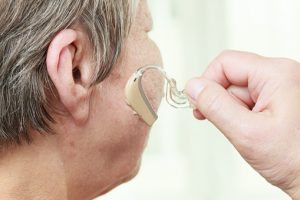 Nearly 25 percent of seniors aged 65 to 74 live with significant hearing loss and that number jumps to 50 percent for those over the age of 65. Many seniors believe that hearing loss is an inevitable part of aging, but there are some things you can do to prevent the progression of hearing loss.
Nearly 25 percent of seniors aged 65 to 74 live with significant hearing loss and that number jumps to 50 percent for those over the age of 65. Many seniors believe that hearing loss is an inevitable part of aging, but there are some things you can do to prevent the progression of hearing loss.
Hearing loss affects much more than just the ability to hear, and unfortunately, many seniors don’t realize this. Hearing loss can impact a person’s emotional, cognitive, and physical health. The worst part is, many seniors who suffer from hearing loss often don’t utilize devices such as hearing aids as a means of improving hearing, which can improve overall health.
Advertisement
Below you will uncover how hearing loss goes beyond the ability to hear and why it’s important that you start taking control and prevent further hearing loss from occurring.
Emotional impact of hearing loss
Being able to hear allows you to be social and communicate freely with others. When you have difficulties hearing, being able to stay social is also a challenge. This causes a person with hearing loss to retreat and avoid social settings. As a result, they may feel alone and isolated. Other problems that can arise include depression, loneliness, anger, decreased personal safety, cognitive decline, and overall poor health.
It is documented that seniors living with hearing loss suffer a poorer quality of life compared to those without. Hearing loss can cause stress in a person, which can be challenging to deal with along with the fact that stress is known to wreak havoc on a person’s health.
Hearing loss can make it difficult for a person to talk to a doctor, handle their finances, be social with friends and family, and simply carry day-to-day tasks.
Physical impact of hearing loss
You may not think that hearing loss can affect someone physically, but it can. A person’s risk of personal safety increases with hearing loss. This is because their ability to hear danger is diminished. For example, a person crossing the road may not hear a honking car horn, which increases their risk of being hit by a car. They may be unable to hear or understand their doctor’s instructions regarding medications or health warnings. Furthermore, many patients with hearing loss tend to have balance issues, which increases their risk of falls and fractures.
Additionally, social isolation has been shown to reduce a person’s willingness to adhere to a healthy lifestyle. This means they are more likely to smoke, drink alcohol, not exercise, and eat poorly, which are all contributing factors for poor overall health.
Advertisement
Hearing loss has also been tied to cognitive impairment in several studies. Meaning, patients with hearing loss are more likely to suffer from dementia or Alzheimer’s compared to a person without hearing loss or a person who uses a hearing device.
As you can see, hearing loss can affect far more than just the ears. Regardless of how old you are, there are still things you can do to either prevent or slow down the progression of hearing loss. This includes listening to sounds at a safe level, wearing protective ear gear, eating well and exercising regularly, controlling underlying health conditions such as blood pressure, cholesterol, and diabetes, and cleaning out your ears safely. And don’t fear the use of hearing aids—they can actually go a long way in preventing many of the consequences that we outlined. Speak to your doctor about more sleek and discreet options.
Related: Age-related hearing loss (presbycusis): Natural home remedies and prevention
